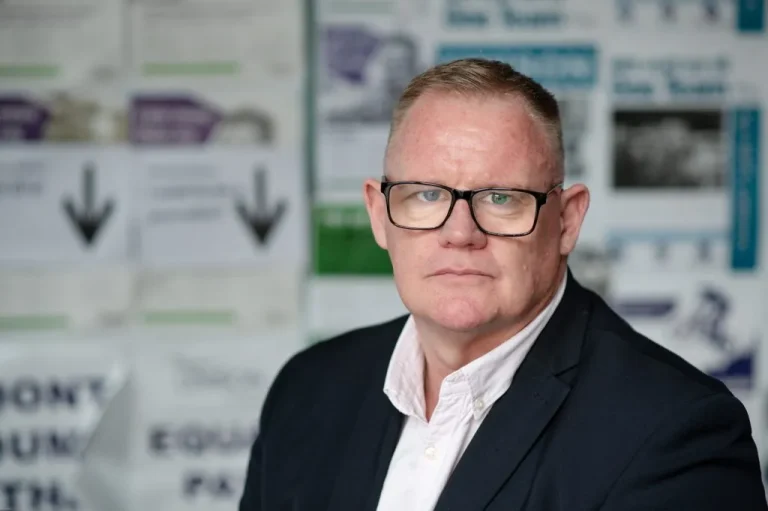The latest NHS pay offer in Scotland “sends a really powerful message” to other UK countries about what can be achieved through direct pay negotiations, Unison Scotland’s co-lead for health has said.
Speaking with Nursing Times, Matt McLaughlin said other UK countries were “hiding behind bureaucracy” when it comes to NHS pay and it was “no good” for the health service.
“In the other parts of the UK, it seems that people are hiding behind bureaucracy”
Matt McLaughlin
His comments came during Unison’s annual Health Care Service Group Conference, which was held in Liverpool this week.
It was announced on Tuesday 8 April that nurses and other NHS staff in Scotland had been offered an 8% pay rise as part of a new two-year pay proposal.
If accepted, Agenda for Change staff in the country will receive a 4.25% increase for 2025-26 and a 3.75% uplift for 2026-27.
Worth over £700m over the two-year period, the offer came as a result of direct negotiations between health trade unions, employers and the Scottish Government.
Mr McLaughlin sat down with Nursing Times at Unison’s health conference to discuss the offer.
He said: “We welcome the fact that Scottish Government have tabled an offer so soon into the financial pay year.
“It’s early days. We now need to consult with our steward or branch structures, and consult with our members over the next month, and then the members will decide whether this is an acceptable offer or not.”
The proposed package, put forward by the Scottish Government, also includes an “inflation guarantee” which will ensure the increase in pay each year is a minimum of one percentage point higher than average Consumer Price Index inflation.
Mr McLaughlin said: “In these uncertain economic times, I think any pay offer that guarantees to be above the average inflation for that period of time is certainly worth considering, particularly when we don’t know what inflation is going to do from week to week, month to month at the minute.”
Asked whether Unison Scotland will be making a recommendation to its members, Mr McLaughlin reiterated that the union’s health committee would be meeting tomorrow, and it would be for them to decide.
Scotland is the first UK country to table a pay offer for 2025-26.
In contrast, England, Wales and Northern Ireland are all facing delays waiting for recommendations of the NHS Pay Review Body (PRB) before an offer can be made.
The UK Government has already told the PRB that a 2.8% pay increase is all it can afford for NHS staff in England in 2025-26.
Unison’s health conference heard calls this week from nurses in Northern Ireland to consign the PRB process “to the history books” and instead adopt a collective bargaining model.
More from Unison’s health conference
Mr McLaughlin said the deal in Scotland “sends a really powerful message” to the other UK countries about the benefits of direct negotiations.
“Make no mistake about it, relationships with the Scottish Government are at times difficult, at times positive, but by sitting in a room and discussing the issues that matter to our members, we can drive the agenda forward together,” he said.
“NHS staff will always get the opportunity to decide whether those proposals are good or bad but, the fact is, we are talking… and we can try to do things together.
“Whereas, in the other parts of the UK, it seems that people are hiding behind bureaucracy and that’s no good for the NHS, and it’s no good for the workforce or the government.”
Unison Scotland had threatened strike action in February over delays to kickstart pay talks.
Asked why the union did this, Mr McLaughlin said it “wanted to make it clear that our members expected a pay offer within a reasonable timeframe”.
Nurses in Scotland are already the best paid in the UK, and the latest deal could push them even further ahead of their UK colleagues.
However, Mr McLaughlin said that the offer alone “does not complete the job that needs to be done on pay”.
He noted that Agenda for Change staff in Scotland still had “uneven” pay increments between bands, and that some promotions only resulted in nurses being a few hundreds pounds better off than before.
“There’s still work to do on pay,” Mr McLaughlin argued.
“My view would be that if the Scottish Government are absolutely serious about reform, then they will tell us what the service is going to look like in the future, and they will discuss with us our pay and conditions package that’s fit for delivering those services.”
The Scottish Government recently committed to implementing dozens of recommendations aimed at improving the recruitment and retention of nurses and midwives across the country.
It followed the publication of a much-awaited report by Scotland’s Ministerial Nursing and Midwifery Taskforce, which set out 44 actions for the government to undertake on key issues affecting the professions.
While the taskforce did not address matters of pay, terms and conditions, its final report did focus on many other core issues, like improving workforce cultures, enhancing working conditions and creating learning opportunities nurses and midwives.
Mr McLaughlin welcomed the publication of the report but said: “Our members won’t judge government on words, they will judge them on what they do.
“I think the challenge for the government, certainly a government at the end of its political cycle, is that they will run out of time before they run out of opportunities to deliver.
“We need to reinforce the point – tell us what kind of services you want to deliver, how we’re going to deliver services, and then let’s create a staffing structure.”
Scotland’s most senior nurse, Anne Armstrong, recently told Nursing Times that the Scottish Government was entering phase two of the taskforce’s work.
This phase will look to develop a detailed work plan for implementation of the recommendations, including timescales and a financial framework.
More on workforce issues in Scotland

